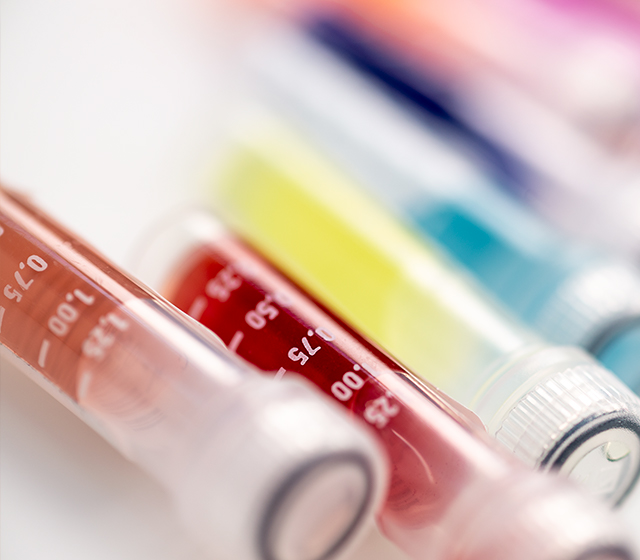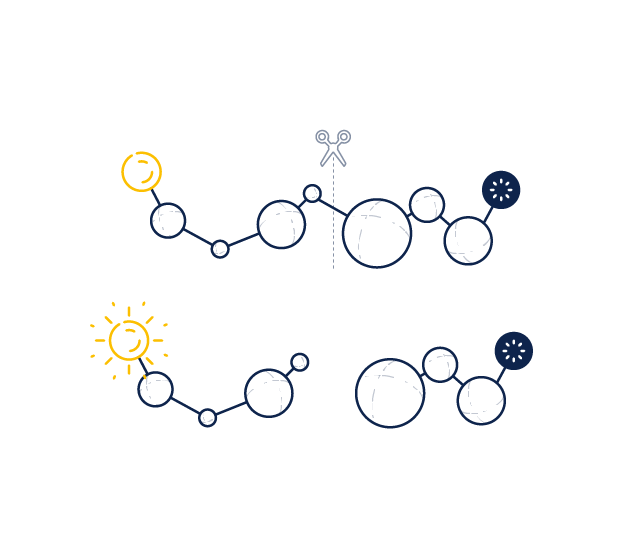Custom Peptides
FRET Peptides
As a world leader in FRET (fluorescence resonance energy transfer) peptide technologies, we propose a full range of dye-quencher pairs for customized assay developments.
Our dye/quencher labeling offer
We offer a full-range of dye-quencher FRET pairs and fluorogenic substrates.
The tables below list the dyes and quenchers available to label your custom peptides
| FRET Pairs | ||
|---|---|---|
| Dye (donor) | Quencher (acceptor) | Donor Ex/Em |
| Mca | Dnp |
•
325/393 nm |
| EDANS | DABCYL, DABCYL Plus, QXL®490 |
•
335/493 nm |
| FAM | QXL®520 |
•
492/518 nm |
| FITC | QXL®520 |
•
494/519 nm |
| HiLyte™ Fluor 488 | QXL®520 |
•
502/527 nm |
| CyLyte Fluor 3 | QXL®570 |
•
550/564 nm |
| HiLyte™ Fluor 555 | QXL®570 |
•
550/566 nm |
| TAMRA | QXL®570 |
•
541/568 nm |
| Rox | QXL®610 |
•
568/591 nm |
| CyLyte Fluor 5 | QXL®670 |
•
648/663 nm |
| HiLyte™ Fluor 647 | QXL®670 |
•
650/675 nm |
| CyLyte Fluor 7 | IR-QXL® |
•
750/773 nm |
QXL® and Dye pairings are available from our custom labeling services & from our catalog SensoLyte® protease activity assay kits
(ie., QXL® 520 - HiLyte™ Fluor 488, QXL® 520 - FAM)
Fluorogenic Substrates
Fluorogenic substrates do not require a quencher and contain a C-terminal dye that does not fluoresce until it is cleaved from the peptide (fluorescent form of dye is released).
| Fluorogenic substrate dyes | |
|---|---|
| Dye | Ex/Em |
| AMC |
•
351/430 nm |
| AFC |
•
382/480 nm |
| Rh110 |
•
501/527 nm |
Why use FRET?
FRETand fluorogenic substrates are more sensitive than chromogenic substrates with linear dynamic range and great reproducibility.
FRET-based peptides are used in a variety of applications, with high benefit when used as protease substrates in high-throughput inhibitor screening & drug discovery.
Benefits
Using Dyes and Quenchers from AnaSpec (Eurogentec's US subsidiary) offers many advantages:
- Unique collection of proprietary quenchers (QXL®) which tandem with the most popular dyes
- Top quality HiLyte™ Fluor dyes
- Access to the Cy dyes at an affordable price (CyLyte dyes which have identical structures to the trademarked Cy®)
- Longer wavelengths for improved sensitivities
- Easy adaptation to high throughput screening assays
Applications
- Protease activity detection & measurement
- Protease-based drug target screening and discovery
- High throughput screening of protease inhibitors
FRET principle
FRET occurs when a donor (fluorophore) and an acceptor (quencher) are in close proximity (within 10-100Å from each other). The energy from the excited fluorophore is transfered to the quencher resulting in no fluorescence emission.
If the donor and acceptor are on a same peptide which is a protease substrate, enzymatic hydrolysis will result in spatial separation of the donor from the acceptor, and fluorescence emission.
Featured Citations
FRET-based trilateration of probes bound within functional ryanodine receptors.
Bengt Svensson,Tetsuro Oda, Florentin R.Nitu, Yi Yang, Iustin Cornea, Ye Chen-Izu, James D.Fessenden, Donald M.Bers, David D.Thomas, Razvan L.Cornea1
Biophysical journal. 2014 Nov 4;107(9):2037-48. https://doi.org/10.1016/j.bpj.2014.09.029From AnaSpec (Eurogentec's US subsidiary) : DPc10 peptides either unlabeled, or labeled with HiLyte Fluor 647 (HF647)
Selective Homogeneous Assay for Circulating Endopeptidase Fibroblast Activation Protein (FAP)
Travis W. Bainbridge, Diana Ronai Dunshee, Noelyn M. Kljavin, Nicholas J. Skelton, Junichiro Sonoda and James A. Ernst
Nature Scientific Report 2017 Oct 2;7 : 12524. 10.1038/s41598-017-12900-8From AnaSpec (Eurogentec's US subsidiary) : Fret peptides containing an amine-terminal donor (HyLite Fluor 488 or Cy5.5 for aP NIRF) and a dark quencher (QXL 520 or QSY21 for aP NIRF) conjugated to a supplementary C-terminal lysine
AMCA to TAMRA long range resonance energy transfer on a flexible peptide.
A. Synak, R.Fudala, I.Gryczynski, L.Kułak, S.Shah, I. E. Serdiuk, B. Grobelna, P.Arłukowicz, A.Kubicki, P.Bojarski
Dyes and Pigments. 2018 Nov;158:60-64From AnaSpec (Eurogentec's US subsidiary) : Lys(AMCA)-Gly-Pro-Arg-Ser-Leu-Ser-Gly-Lys(TAMRA)-NH2 peptide

